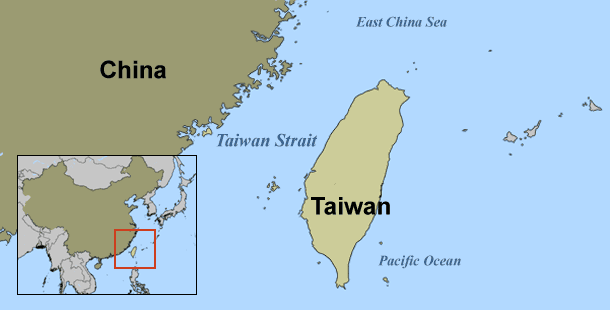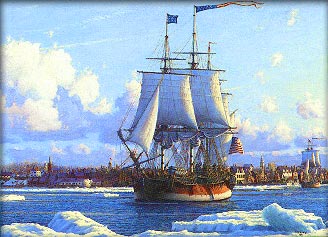
|
Your Most Trusted Source of Foreign
News and Views About the United States
|

The Island Nation of Taiwan. Or Is It a Chinese Province?
Can U.S.-China Ties Prosper Without a Common Threat?
Can Sino-U.S. relations thrive without a common enemy,
like imperial Japan, the Soviet Union or the War on Terror? This op-ed article
from China’s State-controlled media indicates that the answer may be yes, if
America’s Cold Warriors start to see China differently, and they keep their hands off Taiwan.
EDITORIAL
September 9, 2005
Original
Article (English) 
BEIJING: China and the United States share extensive common interests which have pushed
bilateral ties forward and have helped overcome challenges in their relations,
despite a raft of differences and contradictions between them. Peace
and development are the themes of our times. Globalization and multi-polarization
are irreversible trends. These factors are the driving force of
Sino-US relations.
Under such circumstances, an overwhelming
majority of nations pursue development, with their leadership making this
a top priority. China and the United States are no exception. A peaceful external environment
is a prerequisite to development.
China has always taken it as a principle of its foreign policy to safeguard
world peace. Just as it is with China, it is the policy of the U.S. not to land in direct confrontation with the world's
other major powers. Globalization has pushed the world’s nations
closer and made them more interdependent. That is why all nations are more
inclined to pursue cooperation rather than confrontation.
Multipolarization makes competition among
the world's major countries more complicated, and any confrontation between
two major powers can be expected to make everyone the loser. That is why China and the United States will not enter into a conflict, despite the many
barriers between them. The outbreak of any confrontation between the two
countries would not only compromise their own fundamental national interests,
but also be detrimental to global peace and stability.
 First Contact: American Merchant Vessel the Empress of China
First Contact: American Merchant Vessel the Empress of China
The two nations began historical exchanges
as early as 1784, when the "Empress of China," an American merchant
ship, made the long voyage to China. But most Sino-U.S. exchanges before World War II
were unbalanced, with the United States benefiting and China holding a passive role.
The Pacific War, in which the two countries
stood on the same battle front, finally opened a new page in Sino-U.S.
cooperation. But this was based on the threat of a "common enemy," and
therefore lacked a solid foundation. Following the disappearance of this
enemy, the two nations fell into a quagmire of Cold War confrontation.
The threat of the former Soviet Union again prompted our two nations to forge a quasi-alliance,
but ties deteriorated after the collapse of the Soviet Union.
In the wake of September 11, the two countries
once again experienced a honeymoon period, and bilateral ties have reached
a historical peak. The history of Sino-U.S. ties shows
there is disharmony when the two nations lack a common threat.
Thus, where Sino-U.S. ties will go after
the war on terror ends remains a major concern. Without a third party as
a unifying force, could a superpower [the U.S.] and an emerging power [China] co-exist peacefully, rather than entering a head-to-head confrontation?
Fortunately, as the onrush of global events
shows, Sino-U.S. relations are much different than traditional ties among
major powers. Domestic factors on both sides have played an increasingly
vital role since Washington adopted its reform and opening-up policy.
To achieve modernization, China should be open to all developed nations and learn
from their positive experiences. As the largest developed country, the United States naturally became the most desirable country for China to open her doors to, and from whom China can learn. In this exchange, the United States is also gaining benefits.
The fact that the two countries have succeeded
in avoiding a new Cold War after their largest enemy, the Soviet
Union, disappeared, best proves this conclusion.

 The Source of the 'Human Right Friction:' 1989 Pro-Democracy
Protests and the Brutal Massacre that Followed
The Source of the 'Human Right Friction:' 1989 Pro-Democracy
Protests and the Brutal Massacre that Followed
In the 1990s, Sino-U.S. ties experienced
a reversal because of friction over human rights and Taiwan. However, ties generally improved, with economic
and trade cooperation improving and cultural, educational
and academic exchanges deepening.
In the mid-1990s, large-scale discussions
were held among American ruling and opposition parties about the country's China policy. As a result, a basic consensus was reached
that China is not an enemy or rival to the United States, but is a "strategic partner." This type
of partnership is not based upon the threat from a third party.
As the 21st century began with the rapid
rise of Beijing's clout in the global arena, a new round of discussions
was held in the United States about its policy toward China. The core of the discussion was how the United States should deal with China's rapid development, and whether to consider it
as a strategic competitor or as a strategic partner. As a result, the latter
viewpoint, which was backed by U.S. President George W. Bush, prevailed.
This demonstrates that America’s top decision-makers have acknowledged that the
foundation of Sino-U.S. ties comes not only from counter-terrorism, but
also has other dimensions. Moreover, the common interests of the two countries
are more important than their differences, and cooperation with China serves America’s long-term strategic interests. Based on domestic
considerations, ties have increasingly improved.
However, the present "normalization" only
makes deeper cooperation between the two countries more important. A healthy
and stable relationship still depends on the efforts of both sides.
Over recent months, American policy toward China has cast a dark shadow over the relationship. The United
States,
together with Japan, have labeled Taiwan their "common strategic objective." It
also prevented the European Union from lifting its long-standing arms
embargo on China, and pressured Israel into calling off arms sales to Beijing. These factors herald changes in Washington’s policy toward China and may be obstacles to smooth relations.
But the biggest obstacle to relations
today are the Cold War mentality and misgivings held by some Americans toward China. If this outdated view can be overcome, the two
nations can build strategic mutual trust and open a new chapter in cooperation.
© WORLDMEETS.US all rights reserved.




